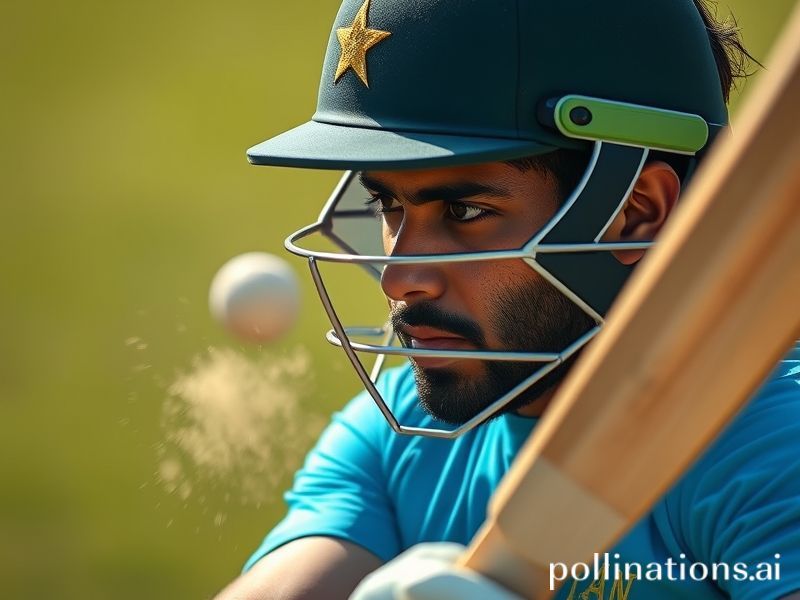Salman Ali Agha: The Quiet Pakistani Batsman Defying Global Chaos One Block at a Time
Salman Ali Agha and the Quiet Art of Surviving the Spotlight
By our South-Asia bureau, nursing its third Nescafé of the morning
Karachi, 3 a.m.—While the rest of the planet doom-scrolls through another geopolitical migraine, a 25-year-old in a green blazer is quietly shouldering Pakistan’s most volatile export: hope. Salman Ali Agha, the latest “next big thing” off the country’s improbable cricket assembly line, isn’t tearing down stadiums with 150-kph thunderbolts or reverse-sweeping balls into orbit. Instead, he’s doing something far more subversive: he’s reliable. In a region where governments last less time than milk left on a windowsill, reliability is practically sedition.
The International Monetary Fund keeps Pakistan on a drip-feed, the glaciers that feed the Indus are applying for early retirement, and half the country’s Twitter lawyers are busy arguing whether a no-ball is a metaphor for foreign debt. Into this carnival of chronic crisis strides Salman—bat tucked under arm, beard immaculately trimmed, voice so soft it could be outsourced as a sleep app. He averages a shade over 40 in Test cricket, which doesn’t sound sexy until you realize the global average for sanity these days hovers around room temperature.
The wider world, of course, only notices Pakistan when something explodes, literally or metaphorically. So when Salman grafted a 96-ball 40 against Australia in a Karachi furnace—imagine playing chess in a pizza oven—Western highlight reels cut straight to the six he eventually mistimed. The graft was left on the editing suite floor, next to nuance and the last pretense of balanced news. Meanwhile, the Asian subcontinent nodded in recognition: another dutiful son holding the family together while the uncles argue over the inheritance.
Global implications? Start with the fact that the Indian Premier League, cricket’s glitziest bazaar, still refuses to pick Pakistani players, citing “political tensions”—a euphemism so threadbare it could moonlight as lingerie. Salman, therefore, plies his trade in Pakistan’s domestic circuit and the occasional English county game, effectively a sporting sanctions regime. Yet every run he scores is a quiet act of economic resistance: proving you don’t need Bollywood endorsement deals to keep scoreboards honest. Call it deglobalisation with cover drives.
China, ever alert to soft-power vacuums, has noticed. Rumors swirl that the next season of the Pakistan Super League will feature Mandarin commentary, presumably so viewers in Guangzhou can learn how to say “he’s middled that” while belt-and-roading their way through Gwadar. Salman, polite to a fault, has already started Duolingo. He’s the sort who apologizes to the ball after edging it—a move that, if adopted by superpowers, might halve the Pentagon’s budget overnight.
Europe, nursing its own identity crisis, watches with anthropological curiosity. In a year when FIFA banned Russia and Wimbledon stripped rankings from Russian players, cricket’s gentle anarchy looks refreshingly chaotic. Salman’s refusal to grandstand—no bat-brandished salutes, no tear-stained retirement speeches at 28—makes him an accidental ambassador for the quaint notion that athletes might just… play sport. Revolutionary stuff.
Back home, the tabloids oscillate between calling him “the next Younis Khan” and “a luxury Pakistan can’t afford,” depending on the phase of the moon and the dollar-rupee exchange rate. Through it all, Salman’s mother keeps texting him grocery lists between innings. “Beta, if you’re 45 not out at tea, pick up some dahi on the way back.” Even existential dread bows to maternal logistics.
So what does Salman Ali Agha ultimately signify in our fractured little planet? Nothing more, and nothing less, than the radical possibility that competence can still be quiet, that diligence might yet outrun despair, and that sometimes the most subversive act is simply showing up—preferably with solid front-foot defense. In an age of megaphones, he’s a metronome. And metronomes, as any jazz musician will tell you, are the first thing revolutionaries smash. Until they realize they can’t keep time without one.
Conclusion: Somewhere between the IMF’s next bailout tranche and the melting Hindu Kush, a young man blocks another off-cutter and jogs a single. The stadium roars, then hushes, waiting for the next delivery. It’s only a game, yes—but on this particular midnight, in this particular corner of the world, it’s also the only script that hasn’t been written by catastrophe. And that, dear reader, is how empires end: not with a bang, but with a forward defensive stroke.







